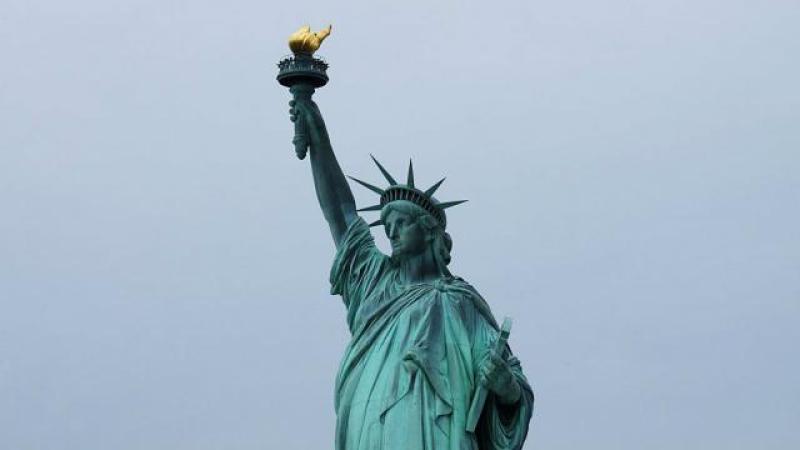Anti-immigration sentiment fueled Donald Trump’s shocking primary victory and seemed to have won him some crucial votes in critical 2016 swing states. But now that he’s in office, public views of immigration are soaring to new heights. A new Pew poll released last week, for example, finds that, for the first time on record, more Americans want to see legal immigration levels increased rather than decreased .
The higher levels of support for immigration are driven by a surge in Democratic enthusiasm, but Republican views are also shifting in the same direction. Overall public opinion on immigration is always somewhat murky and a little hard to parse, but the trends here are unmistakable.


The conjunction of the most anti-immigration presidency in generations with a strong pro-immigration shift in public opinion may seem paradoxical. But scholars of American public opinion have long believed that the public largely behaves like a thermostat and shifts its views in the opposite direction of where it perceives the governing regime to be headed.
The mechanism works, primarily, because most people don’t have strong feelings on most issues. When the Obama administration was trying to use family detention to deter Central American asylum-seekers , for example, they got pushback from activists, but most rank-and-file Democrats didn’t care much one way or the other.
Now that Trump is president, Democrats who are passionately engaged with politics on any issue are strongly attuned to anti-Trump arguments of all kinds, and they’re much more engaged with the topic. Conversely, committed Republican partisans who don’t care much about immigration but perhaps had some vague concern that Obama wasn’t strict enough see how spun-up Trump is about it and feel okay.
Gallup polling also shows more public support for a government-run health system and more people saying the government should prioritize environmental protection over economic growth .
The effect is perhaps particularly strong on the immigration topic precisely because Trump talks so much about it. Contrary to a lot of hazy stereotypes, presidential efforts to use the bully pulpit have a tendency to backfire in exactly this way. After years of immigration being a relatively unpolarized issue, Trump is, for the first time, calling into being a large constituency for more immigration.



 The president’s reverse-Midas touch strikes again.
The president’s reverse-Midas touch strikes again. 



But what does it say about illegal immigration? Legal immigration is fine with me and most other right wingers I would presume. The conventional wisdom is that the most American citizens disapprove of illegal immigration and all the problems it causes
Some liberals don't distinguish between the two by design. Illegal, legal, doesn't seem to matter. Why do you think they do that?/s
When talking about immigration , I think most people would be for immigration, but there are 2 words that matter very much that affects the view a person could take that would prefix the word immigration , those 2 words are "legal" or "Illegal". and like it or not , which word is the prefix , does matter.
At least it does to me when I form my personal opinion.
Of course it matters.
But most people aren't stupid. They understand that if legal immigration is cut to nothing, then desperate people will take the risk of coming illegally. So opening up legal immigration a bit probably lessens the illegal pressure by nearly as much.
Well, has legal immigration been cut back or restricted? Trump has said that he has no problem with that. I can say most assuredly that promoting illegal immigration will be a losing issue for the Democrats in the midterms.
Of course it hasn't but that is of no concern to the irrational. Besides this is really about making someone look bad and keeping your eyes off the lowest unemployment in a generation, 250,000 off food stamps and the lowest unemployment among minorities EVER! You see, keeping the negative aspects front and center and keeping people blind to the positive is the only chance they have of winning. After all, What have elections centered around in the past 2 decades? THE ECONOMY! They know they don't have anyone that can match Trump on the big issue of the day so their only prayer of winning is to try to make something else the number one concern of voters and they are trying real hard, aren't they? Thank God it's backfiring! Of course if they DO get back in power everyone's number one concern will be the economy again soon enough. Several including Bill Meyer have said a recession is the only way to get him out of office and they are more than happy to put us all thorough whatever suffering is necessary to get what they want.
Well of course it has. One would have to be a some sort of Quisling to think otherwise.
.
Jeez, AH!
There you go again! You never play fair... always using facts! That's cheating, you know...
Increasing legal immigration and wanting to prevent illegal aliens from entering the country aren’t mutually exclusive. I support legal immigration but they have to at least be able to fully support themselves i,e. Mexico needs to figure out how to handle its poor other than by dumping them on me.
Most people don't have a problem in good economic times with immigration- as long as it's legal and the immigrants are properly vetted, Having marketable skills, especially in shortage areas, is also a really big plus.
Will some Democrats and liberals ever realize that illegal aliens and lawful immigrants are two separate things?
I don't know anyone who is against legal immigration.
What I don't understand is how any Americans want to be overrun with illegal aliens.